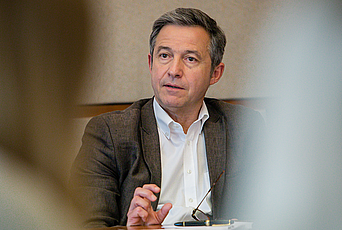For Frankfurter Allgemeine Zeitung, Novina Göhlsdorf interviews James D. Wolfensohn Professor Didier Fassin about conspiracy theories and public health:
Didier Fassin is a physician, specializing in infectious diseases. He has worked as a physician in India and in public health in Tunisia. Later he became a sociologist and anthropologist, and now he is the James D. Wolfensohn Professor at the Institute for Advanced Study in Princeton, NJ. However, medicine and public health have remained his research topics. He has studied healing practices in Senegal, childbirth mortality rates in Ecuador, lead poisoning in France, as well as how to deal with various different epidemics.
Mr. Fassin, as a physician, sociologist, and anthropologist––is life the main focus of your life?
Yes, that is exactly why I chose “life” as the topic of the Adorno Lectures that I delivered in 2016. I wanted to focus on a major paradox of the modern world: on the one hand, the sanctity of life, in the singular, as an abstract principle, in the religious as well as the secular domain; and on the other hand, the inequalities of lives, in the plural, as expressed through the totally different ways of dealing with people. Thus, in the United States there is a fifteen-year gap between the life expectancy at birth of Black school dropout men and white men with a university degree, and in France thirteen years of difference between the poorest and the richest five percent. This should be a priority issue in public health.
Where do we have to start in order to make the specific way of dealing with life more equitable?
As opposed to what most people think, the contributions of medicine and even public health are relatively limited when it comes to reducing the inequalities in life expectancy. Early education, healthy lifestyle and working conditions are much more important. However, since we are talking about life in the plural sense, it is critical to distinguish biological and biographical dimensions. Living can merely mean “being alive,” which translates into living a long life. But it can also mean having a sense of real fulfillment, being able to have a “good life.” As an illustration, in all Western countries, women live longer than men, but for a long time they did not have basic rights, such as the opportunity to open a bank account, to make decisions about their own bodies or simply to have a sense of self-realization. Public health and society at large should acknowledge that, in addition to life expectancy, one should learn to think in terms of the expectations one can have for one’s life. Life is not just a question of quantity, it is also—and perhaps even more—a question of quality.
How can health be public without globalizing a certain Western concept of health and making cultural and local changes?
People in Latin America or Africa rarely complain about the fact that fewer children die from measles or are affected by polio; they generally agree to be vaccinated. They become suspicious when public health is used in order to oppress them. During the cholera epidemic in Ecuador, I saw that indigenous people were hiding from the medical teams because they had the experience of not being allowed to bury their dead. In fact, one often refers to cultural differences in order to stigmatize people’s refusal of medical intervention and to avoid the responsibility for the way medical programs are conducted.
In your lectures at the Collège de France, you offered an anthropological perspective on public health. What is that perspective like?
I highlighted various different elements of the public health complex. For example, how physicians’ knowledge and patients’ experiences contrasted each other and resulted in a new way of dealing with certain illnesses, for example chronic fatigue syndrome. I have studied what we can learn from conspiracy theories in the medical field with regard to the social balance of power, and I was especially interested in the abuse of endangered populations, especially migrants and prison inmates, which had serious health implications.
You also study the meaning of statistics and prognoses. In our everyday pandemic reality it seems that illness and infection can be calculated by capturing rates of incidence and hospitalization. How do you view numbers?
Our society believes in numbers. This current positivism is based on the assumption that facts exist completely independently from their observation and that there are objective and neutral ways to talk about them. It is believed that we can answer large and smaller questions about the creation of states, ethnic conflicts, economic development and public health with Big Data and randomized controlled trials. We certainly need statistics, numbers and graphs, and the pandemic has raised many people’s awareness regarding this way of measuring the world. But we should also be conscious of their limitations. Instead of criticizing the numbers per se, I have shown how they can contradict each other.
How did you do that?
In April of 2020 the projections of the ten research institutes that issued data about worldwide mortality rates for the following three weeks produced very different results: the most pessimistic projection predicted four times as many deaths than the most optimistic one. This had enormous consequences, because the French government, for example, focused on the worst-case scenario, while the former U.S. president focused on the most optimistic prediction and took opposite measures. The French government announced a few months ago, “We can discuss everything, except for the numbers.” You can see how erroneous such a statement can be. We have to be much more serious and more critical with regard to numbers with which we are governed.
Conspiracy theories about the Covid pandemic are still very popular––what makes them so successful?
Epidemics have always been a fertile ground for conspiracy theories, so that is nothing new. We could even say that plots remain relatively rare, even if new technology and social networks facilitate their spread and render them more visible. But today, there is this strange tendency to exaggerate the importance of conspiracy theories––a tendency that feeds the sensationalism of the media, provides work for consulting firms, avoids serious debates, and, in the end, actually fuels conspiracy theories.
But can the meaning of such stories really be overestimated? They divide societies and block the democratic process.
You are totally right. They should be taken seriously. However, it is useless to caricature, condemn or punish those who believe that we do not know everything about the long term effects of vaccines. This actually reinforces their belief in a plot of which they are the victims. Instead we should recognize that public authorities contribute to the impression of a lack of transparency and fuel conspiracy theories by hiding facts, spreading false information and lying to the population. The French government initially stated that masks were useless and testing unnecessary, and later exaggerated hospitalization rates in intensive care units in order to be able to justify more stringent measures, whereas in the United States, Donald Trump fueled conspiratorial ideas about China. So governments have their share in the success of conspiracy theories.
You go even further by saying that conspiracy theories also have a critical potential and that we can learn from them. Why?
Instead of mocking and condemning conspiracy theories, as is usually the case, I suggest looking at them to learn what they can teach us about the world, about the way certain categories of population see it, about the distrust toward politicians and governments they reveal, about the flawed relationship to power and knowledge they demonstrate, and even sometimes about the actual plots they unveil. This was the case during the AIDS epidemic in South Africa, after the dismantling of apartheid. At that time, public health measures were viewed with skepticism: the pharmaceutical industry was accused of using black people as guinea pigs, and white people were suspected of using the epidemic to get rid of poor people. In fact, history has shown that each epidemic in the twentieth century has reinforced racial discrimination and spatial segregation. In addition, it was revealed that none of the clinical trials designed to prevent the transmission of the virus from mothers to children which were conducted on the African continent respected ethical standards. And it was discovered that even in the 1990s a program for biological and chemical warfare was developed in order to kill the residents of the townships. Thus, in this case, the conspiracy theories about HIV were based on real facts.
Recently you conducted a study on the “language of crisis.” Worrisome developments are almost always called a crisis: “Covid crisis,” “climate crisis,” the so-called “migrant crisis.” You think that this is a sign of our times. However, conjuring “crises” is nothing new since the beginning of modern times. What is different today?
Recently, I found the expression “crisis” mentioned 36 times in titles or summaries of articles in the archives of the New York Times within 24 hours. What is remarkable is that while a crisis is a rupture in the normal order of things, there is today a paradoxical normalization of crises, or at least of the discourse on crises, as if crises were our new normal. We should beware of so-called crises in the absence of critical situations, such as the supposed migrant crises which are highlighted by populist parties in Europe, even though factual migration is very low. At the same time, there are critical situations that are not interpreted as crises. Just think of the punitive moment we are going through in many countries, with permanent increase in the prison population whereas criminal activity is decreasing. In addition, supposed or real crises call for urgent measures, which elude necessary structural changes, and even for states of emergency, which limit freedoms and rights considerably. We should always be careful with the political consequences of the language of crisis.
You understand our present time as a time of intensified crises which requires intensified critical thinking. What is critique—for you?
Crisis and criticism have the same Greek root. “Crisis” means both the critical moment in which danger is present, as in illness or war, and the act of differentiation and judgment. Crisis on the one hand, criticism on the other hand. I take critique as a way of looking at the world, or more specifically at the various facts we are confronted to, with the idea that they could be otherwise, as does the main character of Robert Musil’s The Man without Qualities. Doing so, the question becomes: What does it mean that it is this way, and what consequences does it have?
This interview has been reprinted in English by the Institute for Advanced Study. Read the original, published November 22, 2021, at FAZ.
© Frankfurter Allgemeine Zeitung. All rights reserved. Provided by Frankfurter Allgemeine Archiv.



